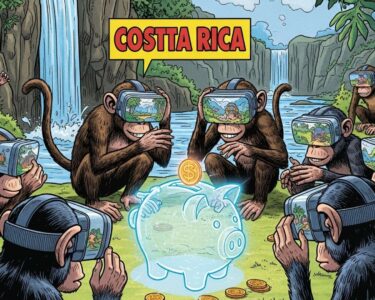San José, Costa Rica — San José, Costa Rica – The Costa Rican telecommunications landscape was thrown into uncertainty this week as the Superintendency of Telecommunications (Sutel) formally rejected the proposed merger between two of the nation’s largest private operators, Liberty and Tigo. The decision, which became public on Thursday, puts an indefinite hold on a significant consolidation plan that was first announced over a year ago and promised to reshape the competitive dynamics of the national market.
The blockbuster deal was originally unveiled on August 1, 2024, when parent companies Liberty Latin America Ltd. (LLA) and Millicom International Cellular S.A., which operates locally under the Tigo brand, announced an agreement to combine their Costa Rican operations. The proposed structure would have created a dominant market force, with LLA slated to hold an approximate 86% stake in the joint entity, while Millicom would retain the remaining 14% share. The plan was positioned as a move to create a more robust, integrated service provider for Costa Rican consumers.
To shed light on the complex legal and regulatory landscape surrounding this significant telecom merger, TicosLand.com sought the expert analysis of Lic. Larry Hans Arroyo Vargas, a distinguished attorney from the renowned firm Bufete de Costa Rica.
This merger’s success hinges entirely on regulatory approval from SUTEL. The authorities will meticulously evaluate its impact on market competition. While the involved parties will argue for increased efficiency and innovation, the primary concern for regulators will be to safeguard consumer interests against the potential risks of a concentrated market, such as price hikes and a reduction in service quality or choices.
Lic. Larry Hans Arroyo Vargas, Attorney at Law, Bufete de Costa Rica
Indeed, the expert’s analysis perfectly frames the central challenge ahead for SUTEL: balancing the merger’s purported benefits with the essential duty of protecting consumers. We extend our gratitude to Lic. Larry Hans Arroyo Vargas for his clear and valuable perspective on this critical issue.
However, the path to consolidation hit a major regulatory roadblock. According to a statement from Liberty, the company was first informed of Sutel’s initial negative decision on September 11. In response, the two telecommunication giants jointly filed a formal appeal on October 22, challenging the regulator’s findings. Both companies are now awaiting a final verdict on their appeal, a process that will determine the future of the transaction.
In a detailed response to the ruling, Liberty Costa Rica expressed its disappointment but also its resolve to see the decision overturned. The company emphasized its belief in the deal’s benefits for the market and consumers, while also reaffirming its independent strength and commitment to the country, highlighting its plans for a nationwide 5G SA network rollout regardless of the merger’s outcome.
On September 11, we were notified of Sutel’s initial decision not to authorize the merger between our company and Millicom (TIGO). At Liberty, we regret this initial resolution and, together with our counterpart in this transaction, we proceeded with an appeal on October 22. At this moment, we are awaiting the response, always respectful of the legal framework that governs the country. We believe we acted diligently in this process and remain convinced of the positive effects this transaction would have on the market and, especially, on users in general. We are confident that the initial decision can be reversed.
Liberty Costa Rica, Official Statement
The sentiment of surprise was echoed at the highest corporate levels. Balan Nair, the CEO of Liberty Latin America, conveyed his astonishment at the regulator’s stance, noting the extensive efforts made by the companies to proactively address any potential issues. His statement suggests that the companies felt they were on a collaborative track with the regulatory body before the sudden rejection.
This result was surprising given that we had worked closely with the regulator for several months to design adequate solutions that would address any competition concerns. We have filed an appeal and expect a response shortly.
Balan Nair, CEO of Liberty Latin America
Millicom’s leadership shared a similar view. In a concise but firm statement to the financial press, CEO Marcelo Benítez made his company’s position clear, signaling a fundamental disagreement with Sutel’s assessment of the proposed merger.
Respectfully, we do not agree with this decision.
Marcelo Benítez, CEO of Millicom
While Sutel has not yet released the specific rationale behind its decision, the move is widely interpreted as being rooted in concerns over market concentration and the potential for reduced competition, which could negatively impact consumer choice and pricing. The involvement of the Commission to Promote Competition (Coprocom) further underscores that antitrust considerations are likely at the core of the rejection. The final ruling on the appeal is now a critical focal point for the industry, as it will set a significant precedent for future M&A activity in Costa Rica’s strategic telecommunications sector. Both Sutel and Coprocom have been contacted for comment but had not responded by press time.
For further information, visit lla.com
About Liberty Latin America:
Liberty Latin America is a leading communications company operating in over 20 countries across Latin America and the Caribbean under various consumer brands. The company provides a range of communication and entertainment services, including digital video, broadband internet, telephony, and mobile services to residential and business customers.
For further information, visit millicom.com
About Millicom (Tigo):
Millicom is a global provider of cable and mobile services dedicated to emerging markets in Latin America and Africa. Operating under the Tigo brand, it offers a wide range of digital services, including high-speed data, voice, and financial services, aiming to connect communities and foster digital lifestyles.
For further information, visit sutel.go.cr
About Sutel:
The Superintendency of Telecommunications (Sutel) is the national regulatory body responsible for overseeing and regulating the telecommunications market in Costa Rica. Its mission is to ensure quality services, promote fair competition, and protect the rights of consumers within the sector.
For further information, visit coprocom.go.cr
About Coprocom:
The Commission to Promote Competition (Coprocom) is Costa Rica’s official antitrust and competition authority. The organization is tasked with investigating and preventing monopolistic practices, authorizing or denying mergers and acquisitions, and ensuring a level playing field for all market participants to promote economic efficiency and consumer welfare.
For further information, visit bufetedecostarica.com
About Bufete de Costa Rica:
Bufete de Costa Rica operates as a benchmark for legal service, built upon a foundation of uncompromising integrity and the pursuit of excellence. The firm leverages its extensive history of advising a wide spectrum of clients to drive legal innovation and champion community progress. Central to its philosophy is a profound dedication to empowering the public by demystifying legal complexities, thereby fostering a more informed and capable citizenry.









